Menstrual Hygiene Day 2025: When a Girl Misses School Every Month
For every year since 2014, the world has celebrated International Menstrual Hygiene Day to raise awareness of the pervasive inequalities surrounding women’s and girls’ abilities to stay clean, safe, and in school during their menstrual periods.
This year, Western Kenyan Impact Communication Officers Olivia Bomji and Jacklyne Chelagat visited St. Mary’s Shihome Girls’ Secondary School to learn how the girls’ periods — and the rest of their lives — have changed since safe, reliable water arrived there in December 2024.
Their resulting reflections on their own past experiences tell the story of our need for menstrual hygiene better than any awareness campaign ever could.
The following portion was written by Olivia Bomji
Access to clean water plays a crucial role in restoring the dignity of girls during their menstruation by enabling them to practice good hygiene and manage their periods effectively. Clean water allows girls to wash their bodies, clean reusable menstrual hygiene products, and wash their hands, all of which are essential for maintaining health and well-being.
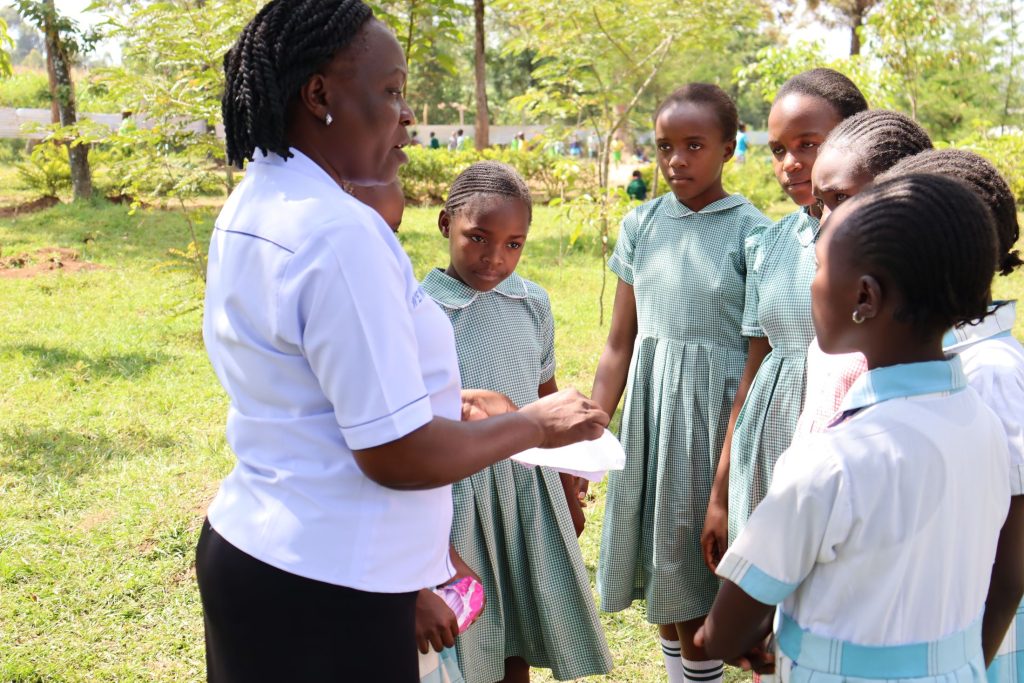
While growing up as a young girl at school some years ago, menstrual hygiene was different and confusing at the same time.
Menstrual periods show that a girl is growing to be an adult. To me, while growing up, I didn’t know periods even existed. I remember one day, I woke up and I found myself so messed up, with blood all over my bed. I ran directly to the toilet to check what was happening to me. I took a bath and changed my clothes to clean ones, but I could see blood still coming out of me. I cried a lot, because I had no idea what was happening to me.
Growing up and being raised in the rural home was good. My parents raised me to obey and listen to what they say. As a family, we embraced the beliefs and culture of our society. Children were supposed to listen to what the parents say, and not vice-versa. So, it was difficult for me to approach my mother to tell her what was happening to me.
That is when I decided to sort myself out by asking my fellow girls what was supposed to be done and why I was seeing blood. They guided me on what to do and told me that I was growing to be a big girl. It was a very tough month for me, and I remember very well how I visited the toilet many times to check whether I had injured myself unknowingly. I didn’t know all about menstrual hygiene. Although we had learned about it at school, it was not a topic that people discussed a lot, and young girls were not aware of it.
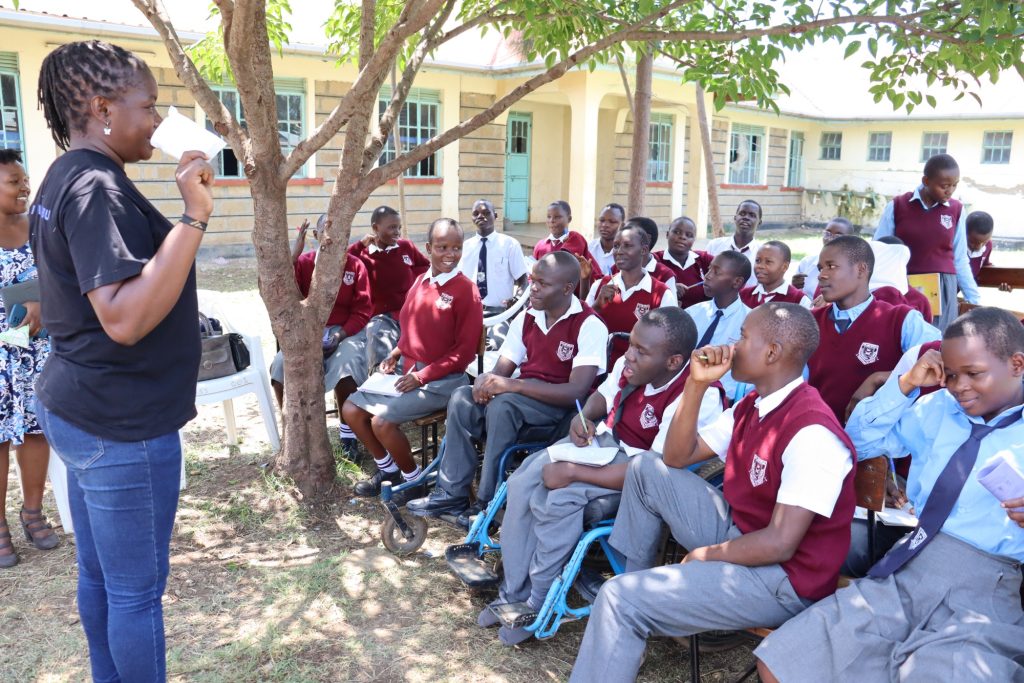
“Worldwide, only 2 out of 5 schools (39%) provide menstrual health education.”
Progress on drinking water, sanitation, and hygiene in schools 2015-2023: special focus on menstrual health, UNICEF/WHO Joint Monitoring Programme
The worst part of my story is that we didn’t have water at school. We were carrying water every day from home to school. It was so stressful to experience my menses for the first time and not being able to wash my hands and clean myself. This really affected me psychologically, because I didn’t have enough knowledge on how to handle myself. All the menstrual cramps, not having sanitary pads, and not knowing how to handle the whole situation were so overwhelming.
I remember soiling my clothes and even my chair at school, and it was so embarrassing. In those days, sanitary towels were not common, so we used used clothes as sanitary pads, which could not hold blood for long. This used to force me to wait until my classmates were out of the classroom so that I could stand to check whether I was clean or not.
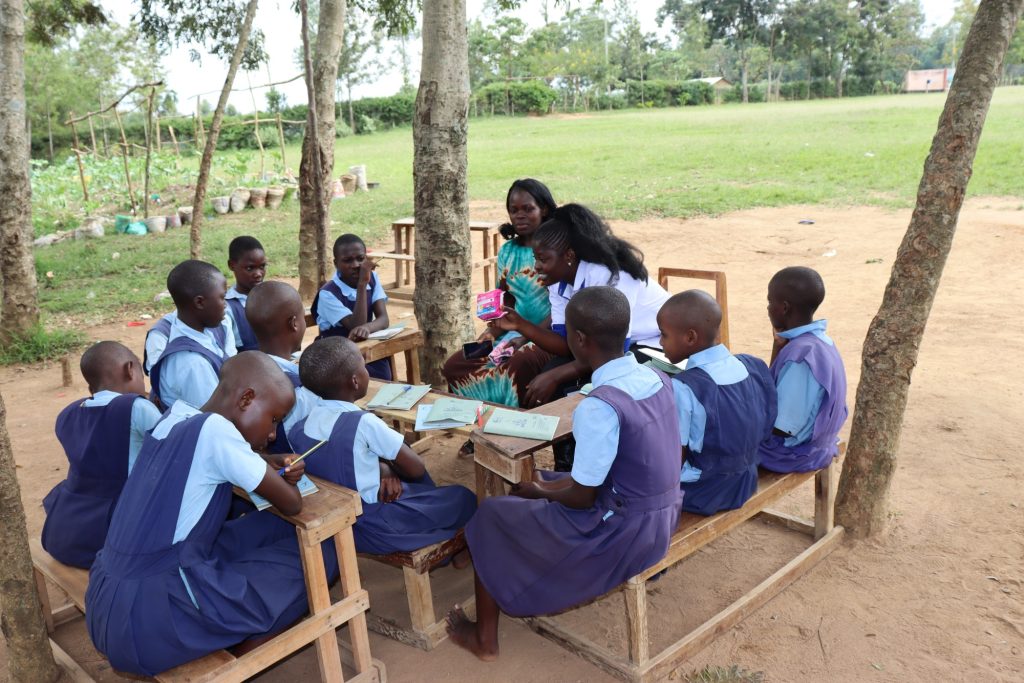
And because we didn’t have water at school to clean my dress, I had to wrap my jacket around my waist to hide the mess for hours before we went home for me to clean myself. It was so traumatizing and stressful, because I could not play with others freely. I was feeling dirty and smelly, and even concentrating in class was very difficult.
The world has been changing with technology and the introduction of social media. This has enabled many to learn and even create awareness about menstrual hygiene, water, dignity, and a girl’s right to learn. Both government and non-governmental organizations are making sure that school-going girls are comfortable at school. Some are even distributing free sanitary pads in schools.
When I compare my days in school to those of a girl now, a lot has changed. The girls are now aware about menstrual hygiene.
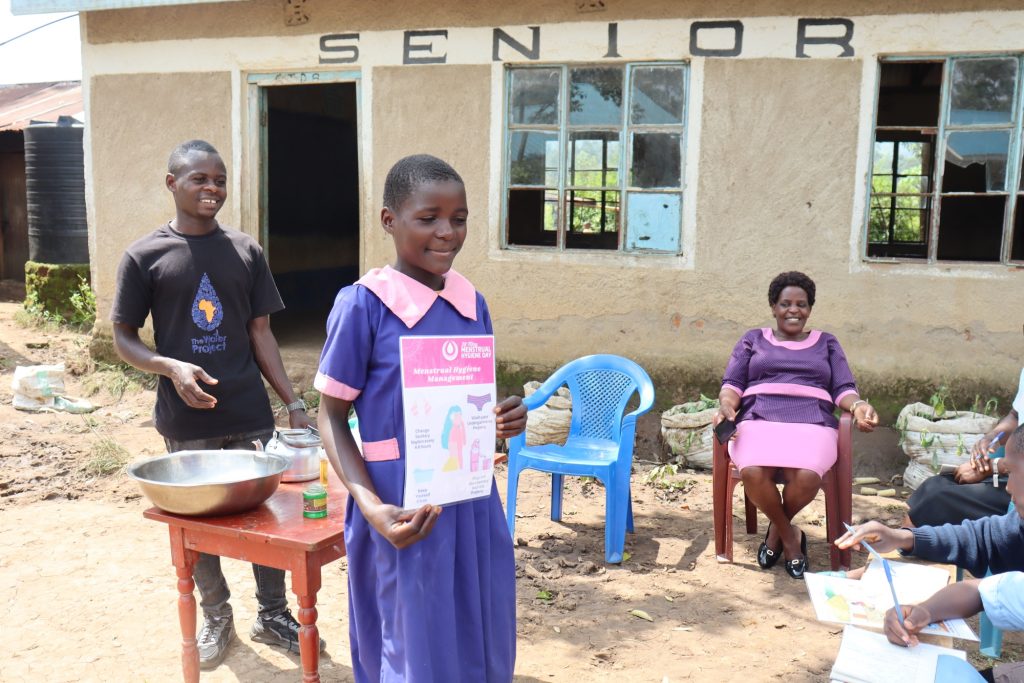
To crown it all, The Water Project is doing wonders in many schools in sub-Saharan Africa. Drilling borehole wells in schools guarantees girls access to clean and safe water throughout the year. Also, training girls on Water, Sanitation, and Hygiene is a plus. This means that the dignity of the girls is restored, and they can be proud to be girls.
As some organizations are distributing free sanitary pads in schools, The Water Project, in partnership with the Government of Kenya, is adding more value in ensuring that clean water is flowing in schools.
It is my prayer that we can change the mindset of that girl who is still experiencing challenges from a lack of water in her school by supporting The Water Project. Let’s all come together to reach schools in Sub-Saharan Africa that are still struggling to get access to clean and safe water.
Remember, water and dignity give a girl the right to learn.
The following portion was written by Jacklyne Chelagat
I attended my primary school education at Simbi Primary School. I remember when I was in class (grade) six, the teacher came to teach us about menstrual hygiene. Being a topic that was addressing girls, I felt so shy, because in the same class, there were boys.
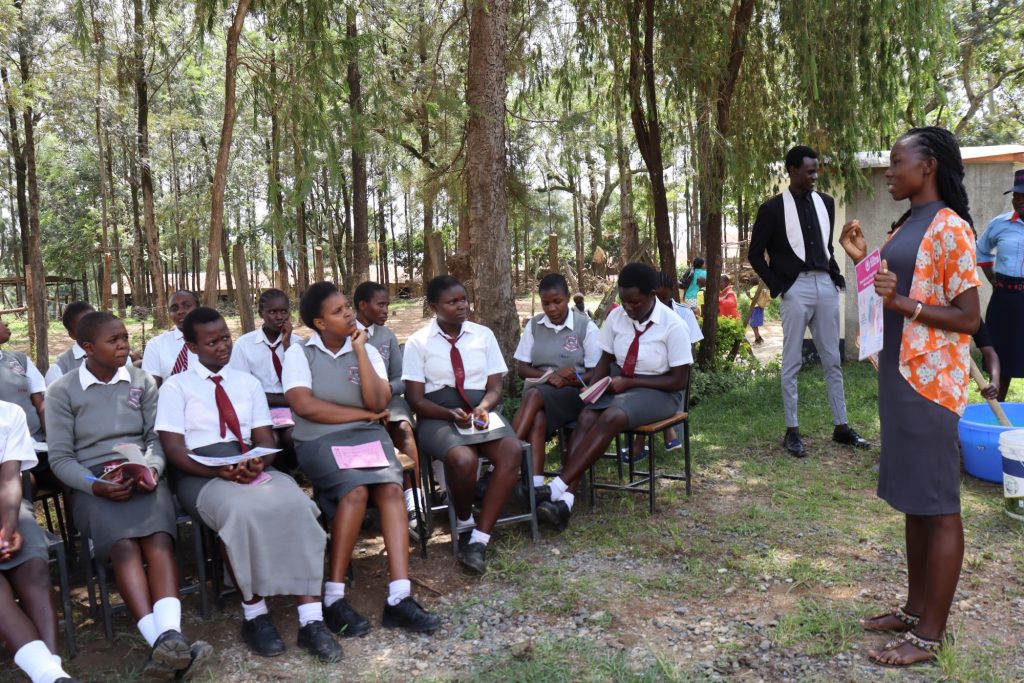
While the teacher was teaching, a lot of questions were lingering in my mind. When am I going to see my period? How will I feel? What will my classmates say about it if they know I’m on my period? Who will I confide in and share with my state?
The class lesson ended, and as the teacher left the class, I felt like following her so that she could help me answer the many questions I had, since I was afraid of asking them in front of my classmates. Apparently, I didn’t, though. I waited in silence.
As the days progressed, I was still a troubled girl, I was anxious about when I was going to see my menses, like the Israelites waiting to enter the promised land. Hours passed, days progressed, and some months passed, too. Towards the end of my last term in grade six, the mentioned symptoms by the teacher became so evident. And, indeed, it was the onset.
I must say, I cried a lot, since there was no one I could tell about my great changes. My stepmother was so unfriendly, and I feared confiding in her. It was so difficult to access sanitary towels, since they were very costly. As a needy girl, I was forced to cut small pieces of cloth to help me during this period. Where I got this idea, up to now, I don’t know!
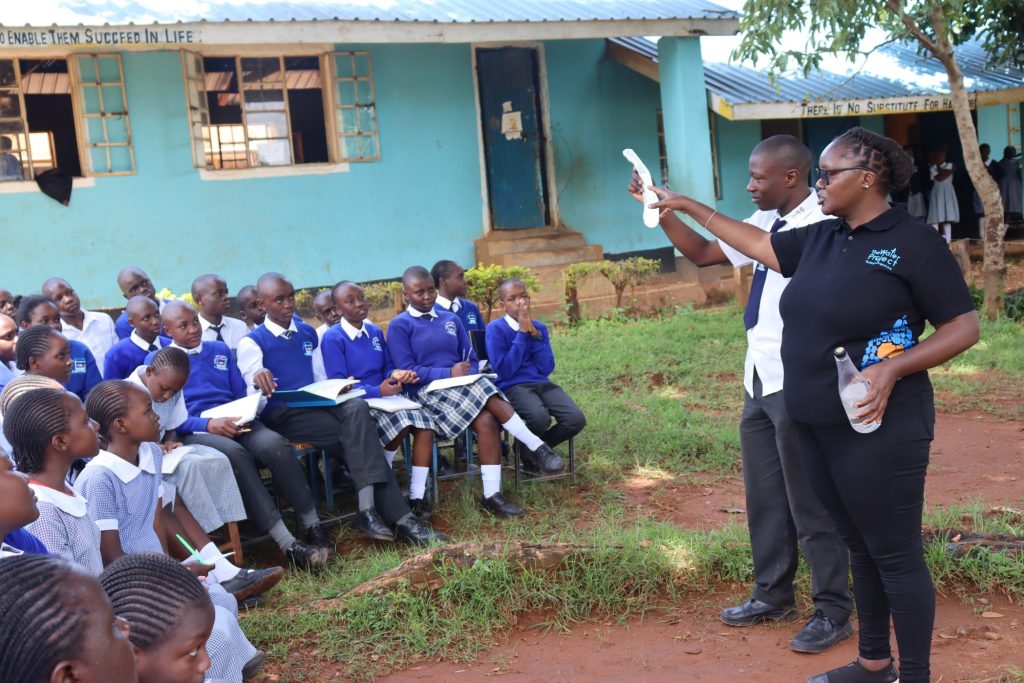
During this time, I realized that it was so important to have adequate water for cleaning the pieces of cloth, bathing, and cleaning my hands. This period was confusing, very difficult, and at the same time, very sad.
The predicament was that, whenever I went to school, I lacked sufficient water for cleaning myself. The school had small rainwater tanks whose water was never sufficient for the whole school population. Whenever the water was used up, or during dry seasons when there was no water, we were forced to carry water from home.
At home, it was challenging, too, because we fetched water from a partially protected spring that was very far away. The water we brought home was never enough to cater for all our needs, let alone for carrying some to school. So, anytime I carried water to school, it created a war with my stepmother.
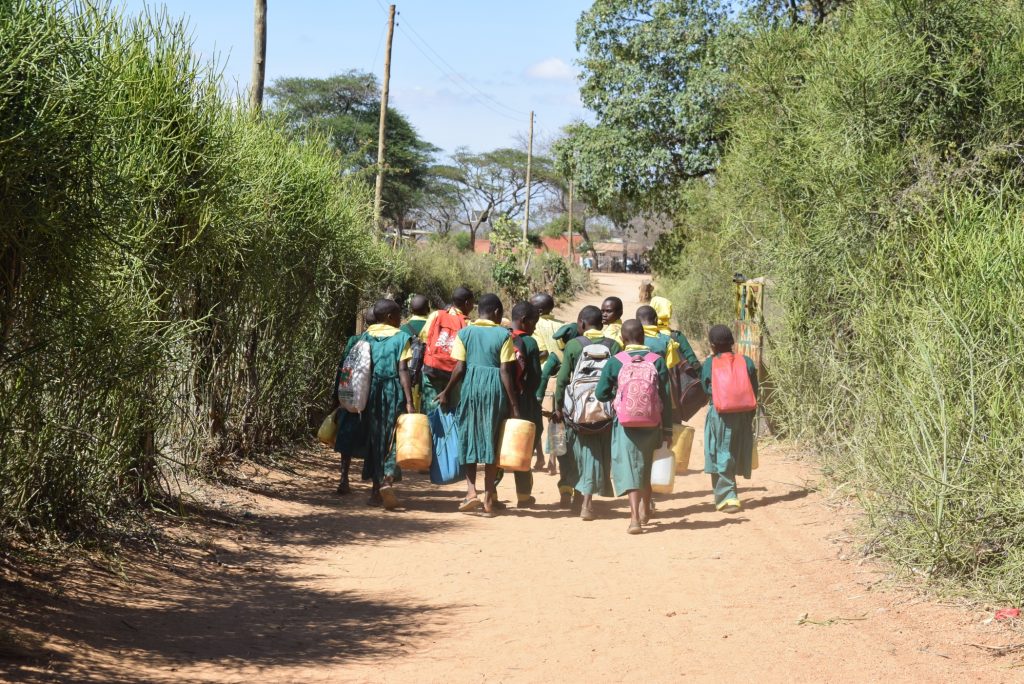
I could bathe only once in day and, according to my teacher, this was not enough. “Why was I born to suffer?” were my innermost sentiments during this period. I was so disturbed and, to some extent, I lost self-esteem.
Anytime I went to school, I was isolating myself, since I felt I was smelly and probably messing up my uniform. Most of the time, I wrapped my sweater around my waist to avoid being laughed at by naughty boys and dropping my concentration in class to perform poorly in my academics. My dream of becoming a doctor when I grew up started to fade away. Sometimes, I wished I were born a boy child, since I realized a girl child has more struggles in life.
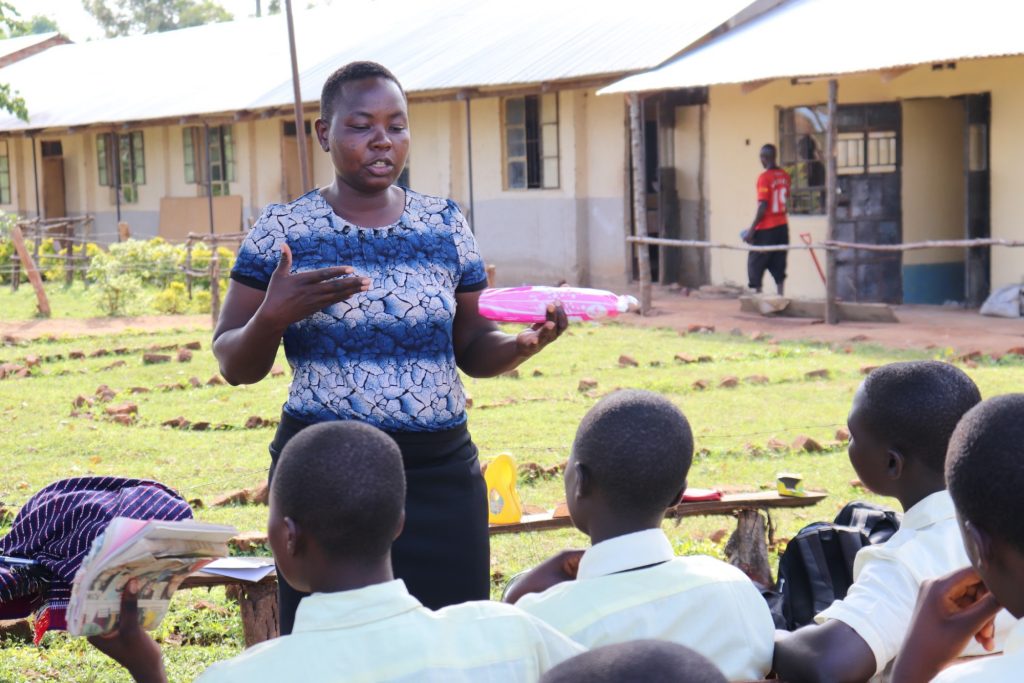
For a girl to uphold her dignity during her menstruation, she needs access to sanitary towels and an adequate supply of clean water. In recent days, the government of Kenya has played a crucial role in distributing sanitary towels in schools and giving them freely to girls.
On the other hand, we have The Water Project, which has played a vital role in ensuring most of the schools and communities in Western Kenya have access to reliable, clean, and safe water and proper sanitation facilities. This has really impacted school-going girls; they are very neat, they are excited to go to school, and they concentrate more on their academics. That is why they are even performing so well in their exams and going ahead to achieve their careers.


Shihome Girls Secondary School is one of the schools that has access to clean and safe water courtesy of The Water Project. During our visit, we were impressed to see girls who were so neat, confident, and happy.
The discussion we held on menstruation was breathtaking. Compared to what I went through when I was their age, this is worth celebrating.
“I am very happy that I am a girl child,” said student Charity K. “Due to the water project in our school, we are staying in a clean environment, bathe as many times as possible whenever we are in our menstruation period, wash our hands, and use clean latrines. I am a very proud girl, and I believe my dreams of becoming a doctor will be achieved.”

Coming together and ensuring schools and communities get access to a sufficient flow of clean water is a great step in restoring the dignity of girls during their menstruation periods.
Come one, come all — let’s support The Water Project to help a girl child gain access to safe, reliable water.
Home More Like ThisTweet